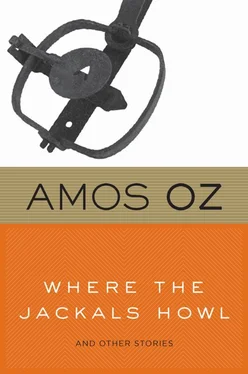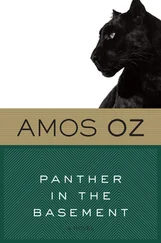Amos Oz - Where the Jackals Howl
Здесь есть возможность читать онлайн «Amos Oz - Where the Jackals Howl» весь текст электронной книги совершенно бесплатно (целиком полную версию без сокращений). В некоторых случаях можно слушать аудио, скачать через торрент в формате fb2 и присутствует краткое содержание. Год выпуска: 2012, Издательство: Houghton Mifflin Harcourt, Жанр: Современная проза, на английском языке. Описание произведения, (предисловие) а так же отзывы посетителей доступны на портале библиотеки ЛибКат.
- Название:Where the Jackals Howl
- Автор:
- Издательство:Houghton Mifflin Harcourt
- Жанр:
- Год:2012
- ISBN:нет данных
- Рейтинг книги:4 / 5. Голосов: 1
-
Избранное:Добавить в избранное
- Отзывы:
-
Ваша оценка:
- 80
- 1
- 2
- 3
- 4
- 5
Where the Jackals Howl: краткое содержание, описание и аннотация
Предлагаем к чтению аннотацию, описание, краткое содержание или предисловие (зависит от того, что написал сам автор книги «Where the Jackals Howl»). Если вы не нашли необходимую информацию о книге — напишите в комментариях, мы постараемся отыскать её.
Where the Jackals Howl — читать онлайн бесплатно полную книгу (весь текст) целиком
Ниже представлен текст книги, разбитый по страницам. Система сохранения места последней прочитанной страницы, позволяет с удобством читать онлайн бесплатно книгу «Where the Jackals Howl», без необходимости каждый раз заново искать на чём Вы остановились. Поставьте закладку, и сможете в любой момент перейти на страницу, на которой закончили чтение.
Интервал:
Закладка:
Amos Oz
Where the Jackals Howl
Where the Jackals Howl
1
AT LAST the heat wave abated.
A blast of wind from the sea pierced the massive density of the khamsin, opening up cracks to let in the cold. First came light, hesitant breezes, and the tops of the cypresses shuddered lasciviously, as if a current had passed through them, rising from the roots and shaking the trunk.
Toward evening the wind freshened from the west. The khamsin fled eastward, from the coastal plain to the Judean hills and from the Judean hills to the rift of Jericho, from there to the deserts of the scorpion that lie to the east of Jordan. It seemed that we had seen the last khamsin. Autumn was drawing near.
Yelling stridently, the children of the kibbutz came streaming out onto the lawns. Their parents carried deck chairs from the verandas to the gardens. “It is the exception that proves the rule,” Sashka is fond of saying. This time it was Sashka who made himself the exception, sitting alone in his room and adding a new chapter to his book about problems facing the kibbutz in times of change.
Sashka is one of the founders of our kibbutz and an active, prominent member. Squarely built, florid and bespectacled, with a handsome and sensitive face and an expression of fatherly assurance. A man of bustling energy. So fresh was the evening breeze passing through the room that he was obliged to lay a heavy ashtray on a pile of rebellious papers. A spirited straightforwardness animated him, giving a trim edge to his sentences. Changing times, said Sashka to himself, changing times require changing ideas. Above all, let us not mark time, let us not turn back upon ourselves, let us be vigorous and alert.
The walls of the houses, the tin roofs of the huts, the stack of steel pipes beside the smithy, all began to exhale the heat accumulated in them during the days of the khamsin.
Galila, daughter of Sashka and Tanya, stood under the cold shower, her hands clasped behind her neck, her elbows pushed back. It was dark in the shower room. Even the blond hair lying wet and heavy on her shoulders looked dark. If there was a big mirror here, I could stand in front of it and look myself over. Slowly, calmly. Like watching the sea wind that’s blowing outside.
But the cubicle was small, like a square cell, and there was no big mirror, nor could there have been. So her movements were hasty and irritable. Impatiently she dried herself and put on clean clothes. What does Matityahu Damkov want of me? He asked me to go to his room after supper. When we were children we used to love watching him and his horses. But to waste the evening in some sweaty bachelor’s room, that’s asking too much. True, he did promise to give me some paints from abroad. On the other hand, the evening is short and we don’t have any other free time. We are working girls.
How awkward and confused Matityahu Damkov looked when he stopped me on the path and told me I should come to his room after supper. And that hand in the air, waving, gesticulating, trying to pluck words out of the hot wind, gasping like a fish out of water, not finding the words he was looking for. “This evening. Worth your while to drop in for a few minutes,” he said. “Just wait and see, it will be interesting. Just for a while. And quite… er… important. You won’t regret it. Real canvases and the kind of paints professional artists use, as well. Actually, I got all these things from my cousin Leon who lives in South America. I don’t need paints or canvases. I… er… and there’s a pattern as well. It’s all for you, just make sure that you come.”
As she remembered these words, Galila was filled with nausea and amusement. She thought of the fascinating ugliness of Matityahu Damkov, who had chosen to order canvases and paints for her. Well, I suppose I should go along and see what happens and discover why I am the one. But I won’t stay in his room more than five minutes.
2
IN THE mountains the sunset is sudden and decisive. Our kibbutz lies on the plain, and the plain reduces the sunset, lessens its impact. Slowly, like a tired bird of passage, darkness descends on the land surface. First to grow dark are the barns and the windowless storerooms. The coming of the darkness does not hurt them, for it has never really left them. Next it is the turn of the houses. A timer sets the generator in motion. Its throbbing echoes down the slope like a beating heart, a distant drum. Veins of electricity awake into life and a hidden current passes through our thin walls. At that moment the lights spring up in all the windows of the veterans’ quarters. The metal fittings on the top of the water tower catch the fading rays of daylight, hold them for a long moment. Last to be hidden in the darkness is the iron rod of the lightning conductor on the summit of the tower.
The old people of the kibbutz are still at rest in their deck chairs. They are like lifeless objects, allowing the darkness to cover them and offering no resistance.
Shortly before seven o’clock the kibbutz begins to stir, a slow movement toward the dining hall. Some are discussing what has happened today, others discuss what is to be done tomorrow, and there are a few who are silent. It is time for Matityahu Damkov to emerge from his lair and become a part of society. He locks the door of his room, leaving behind him the sterile silence, and goes to join the bustling life of the dining hall.
3
MATITYAHU DAMKOV is a small man, thin and dark, all bone and sinew. His eyes are narrow and sunken, his cheekbones slightly curved, an expression of “I told you so” is fixed upon his face. He joined our kibbutz immediately after World War II. Originally he was from Bulgaria. Where he has been and what he has done, Damkov does not tell. And we do not demand chapter and verse. However, we know that he has spent some time in South America. He has a mustache as well.
Matityahu Damkov’s body is a cunning piece of craftsmanship. His torso is lean, boyish, strong, almost unnaturally agile. What impression does such a body make on women? In men it arouses a sense of nervous discomfort.
His left hand shows a thumb and a little finger. Between them is an empty space. “In time of war,” says Matityahu Damkov, “men have suffered greater losses than three fingers.”
In the daytime he works in the smithy, stripped to the waist and gleaming with sweat, muscles dancing beneath the taut skin like steel springs. He solders together metal fittings, welds pipes, hammers out bent tools, beats worn-out implements into scrap metal. His right hand or his left, each by itself is strong enough to lift the heavy sledgehammer and bring it down with controlled ferocity on the face of the unprotesting metal.
Many years ago Matityahu Damkov used to shoe the kibbutz horses, with fascinating skill. When he lived in Bulgaria it seems that his business was horsebreeding. Sometimes he would speak solemnly of some hazy distinction between stud horses and work horses, and tell the children gathered around him that he and his partner or his cousin Leon used to raise the most valuable horses between the Danube and the Aegean.
Once the kibbutz stopped using horses, Matityahu Damkov’s craftsmanship was forgotten. Some of the girls collected redundant horseshoes and used them to decorate their rooms. Only the children who used to watch the shoeing, only they remember sometimes. The skill. The pain. The intoxicating smell. The agility. Galila used to chew a lock of blond hair and stare at him from a distance with gray, wide-open eyes, her mother’s eyes, not her father’s.
She won’t come.
I don’t believe her promises.
Читать дальшеИнтервал:
Закладка:
Похожие книги на «Where the Jackals Howl»
Представляем Вашему вниманию похожие книги на «Where the Jackals Howl» списком для выбора. Мы отобрали схожую по названию и смыслу литературу в надежде предоставить читателям больше вариантов отыскать новые, интересные, ещё непрочитанные произведения.
Обсуждение, отзывы о книге «Where the Jackals Howl» и просто собственные мнения читателей. Оставьте ваши комментарии, напишите, что Вы думаете о произведении, его смысле или главных героях. Укажите что конкретно понравилось, а что нет, и почему Вы так считаете.












